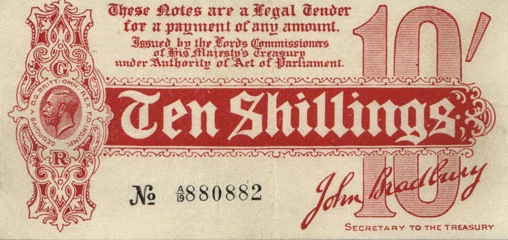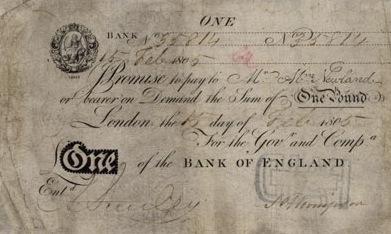|
Ten Shilling Note
The Bank of England 10 shilling note (notation: 10/–), colloquially known as the 10 bob note, was a sterling banknote. Ten shillings in £sd (written 10s or 10/–) was half of one pound. The ten-shilling note was the smallest denomination note ever issued by the Bank of England. The note was issued by the Bank of England for the first time in 1928 and continued to be printed until 1969. The note ceased to be legal tender in 1970 and was discontinued in favour of the fifty pence coin due to inflation and decimalisation. History In the 18th and 19th centuries, banknotes were handwritten or part-printed and could be exchanged, in whole or in part, for an equivalent amount of gold when presented at the bank. During the First World War the British Government wanted to maintain its stocks of bullion and so banks were ordered to stop exchanging banknotes for gold. £1 and 10/– notes were introduced by the Treasury in lieu of gold sovereigns. These notes were nicknamed "Bradburys" ... [...More Info...] [...Related Items...] OR: [Wikipedia] [Google] [Baidu] |
Shilling (British Coin)
The United Kingdom, British shilling, abbreviated "1s" or "1/-", was a unit of currency and a denomination of Coins of the United Kingdom, sterling coinage worth of one Pound (currency), pound, or twelve Penny (British pre-decimal coin), pre-decimal pence. It was first minted in the reign of Henry VII of England, Henry VII as the testoon, and became known as the shilling, from the Old English , sometime in the mid-16th century. It circulated until 1990. It was commonly known as a ''bob'', as in "ten-bob note", also the Scout Association's Bob a Job Week. The shilling was last minted in 1966, prior to Decimal Day, decimalisation. Following decimal day on 15 February 1971 the coin had a value of Five pence (British coin), five new pence, and a new coin of the same value but labelled as "five new pence" (later removing "new" after 1980) was minted with the same size as the shilling until 1990. The five-pence coin was reduced in size in 1990, and the old larger five-pence coins and t ... [...More Info...] [...Related Items...] OR: [Wikipedia] [Google] [Baidu] |
Permanent Secretary To The Treasury
The UK Permanent Secretary to the Treasury is the most senior civil servant at HM Treasury. The post originated as that of Assistant Secretary to the Treasury in 1805; that office was given new duties and renamed in 1867 as a Permanent Secretaryship. The position is generally regarded as the second most influential in His Majesty's Civil Service; Andrew Turnbull (Permanent Secretary from 1998 to 2002) and Gus O'Donnell (2002–2005) were Permanent Secretaries to the Treasury who then became Cabinet Secretary, the most influential post. Previous incumbents have not always maintained the political neutrality expected of civil servants; in 1909 Sir George Murray was involved in lobbying various Crossbench peers in the House of Lords to reject the Chancellor of the Exchequer's proposed budget. In 2014, during the Scottish Independence referendum campaign, Sir Nicholas Macpherson broke with convention by publishing private advice to Chancellor of the Exchequer George Osborne. ... [...More Info...] [...Related Items...] OR: [Wikipedia] [Google] [Baidu] |
Banknotes Of England
The pound sterling (symbol: Pound sign, £; ISO 4217 currency code: GBP) is the official currency of the United Kingdom, Jersey, Guernsey, the Isle of Man, British Antarctic Territory, South Georgia and the South Sandwich Islands, and Tristan da Cunha. The Bank of England has a legal monopoly of banknote issuance in England and Wales. Six other banks (Banknotes of Scotland, three in Scotland and Banknotes of Northern Ireland, three in Northern Ireland) also issue their own banknotes as provisioned by the Banking Act 2009, but the law requires that the issuing banks hold a sum of Bank of England note issues, Bank of England banknotes (or gold) equivalent to the total value of notes issued. Versions of the pound sterling issued by Crown dependencies and other areas are regulated by their local governments and not by the Bank of England. Four British Overseas Territories (Gibraltar, Saint Helena, Ascension Island and the Falkland Islands) also have currencies called pounds which ... [...More Info...] [...Related Items...] OR: [Wikipedia] [Google] [Baidu] |
Half Sovereign
The half sovereign is a British gold coin face value, denominated at one-half of a pound sterling. First issued in its present form in 1817, it has been struck by the Royal Mint in most years since 1980 as a collector's and bullion coin, bullion piece. The half sovereign was originally introduced in 1544 during the reign of Henry VIII of England, Henry VIII but the issue was discontinued after 1604. In 1817, as part of the Great Recoinage of 1816, Great Recoinage, half sovereigns and sovereign (British coin), sovereigns were reintroduced. Until it was discontinued as a currency coin in 1926, the half sovereign was struck in most years and circulated widely. In addition to being coined in London, it was struck at the colonial mints in Australia and South Africa. Exacting standards made it difficult to strike, and it was considered for elimination in the 1880s despite its popularity. Production of half sovereigns continued until 1926 and, apart from special issues for coronatio ... [...More Info...] [...Related Items...] OR: [Wikipedia] [Google] [Baidu] |
Bank Of England Note Issues
The Bank of England, which is now the central bank of the United Kingdom, British Crown Dependencies and British Overseas Territories, has issued banknotes since 1694. In 1921 the Bank of England gained a legal monopoly on the issue of banknotes in England and Wales, a process that started with the Bank Charter Act 1844, when the ability of other banks to issue notes was restricted. Banknotes were originally hand-written; although they were partially printed from 1725 onwards, cashiers still had to sign each note and make them payable to someone. Notes were fully printed from 1855. Since 1970, the Bank of England's notes have featured portraits of British historical figures. Of the Banknotes of the pound sterling, eight banks authorised to issue sterling notes in the UK, only the Bank of England can issue banknotes in England and Wales, where its notes are legal tender. Bank of England notes are not legal tender in Scotland and Northern Ireland, but are always accepted by tra ... [...More Info...] [...Related Items...] OR: [Wikipedia] [Google] [Baidu] |
Walter Raleigh
Sir Walter Raleigh (; – 29 October 1618) was an English statesman, soldier, writer and explorer. One of the most notable figures of the Elizabethan era, he played a leading part in English colonisation of North America, suppressed rebellion in Ireland, helped defend England against the Spanish Armada and held political positions under Elizabeth I. Raleigh was born to a landed gentry family of Protestant faith in Devon, the son of Walter Raleigh and Catherine Champernowne. He was the younger half-brother of Sir Humphrey Gilbert and a cousin of Sir Richard Grenville. Little is known of his early life, though in his late teens he spent some time in France taking part in the religious civil wars. In his 20s he took part in the suppression of rebellion in the colonisation of Ireland; he also participated in the siege of Smerwick. Later, he became a landlord of property in Ireland and mayor of Youghal in east Munster, where his house still stands in Myrtle Grove. He rose ... [...More Info...] [...Related Items...] OR: [Wikipedia] [Google] [Baidu] |
William Shakespeare
William Shakespeare ( 23 April 1564 – 23 April 1616) was an English playwright, poet and actor. He is widely regarded as the greatest writer in the English language and the world's pre-eminent dramatist. He is often called England's national poet and the "Bard of River Avon, Warwickshire, Avon" or simply "the Bard". His extant works, including William Shakespeare's collaborations, collaborations, consist of some Shakespeare's plays, 39 plays, Shakespeare's sonnets, 154 sonnets, three long narrative poems and a few other verses, some of uncertain authorship. His plays List of translations of works by William Shakespeare, have been translated into every major modern language, living language and are performed more often than those of any other playwright. Shakespeare remains arguably the most influential writer in the English language, and his works continue to be studied and reinterpreted. Shakespeare was born and raised in Stratford-upon-Avon, Warwickshire. At the age of 18 ... [...More Info...] [...Related Items...] OR: [Wikipedia] [Google] [Baidu] |
Bank Of England £20 Note
The Bank of England £20 note is a sterling banknote. It is the second-highest denomination of banknote currently issued by the Bank of England. The current polymer notes, first issued on 5 June 2024, bears the image of King Charles III on the obverse. The other note first issued on 20 February 2020, bears the image of the late Queen Elizabeth II on the obverse and the image of painter J. M. W. Turner on the reverse. It replaced the cotton paper note featuring a portrait of economist Adam Smith, first issued in 2007. History Twenty pound notes were introduced by the Bank of England for the first time in 1725. The earliest notes were handwritten, and were issued to individuals as needed. These notes were written on one side only and bore the name of the payee, the date, and the signature of the issuing cashier. With the exception of the Restriction Period between 1797 and 1821 when the French Revolutionary Wars and the Napoleonic Wars caused a bullion shortage, these notes coul ... [...More Info...] [...Related Items...] OR: [Wikipedia] [Google] [Baidu] |
Elizabeth II
Elizabeth II (Elizabeth Alexandra Mary; 21 April 19268 September 2022) was Queen of the United Kingdom and other Commonwealth realms from 6 February 1952 until Death and state funeral of Elizabeth II, her death in 2022. She had been queen regnant of List of sovereign states headed by Elizabeth II, 32 sovereign states during her lifetime and was the monarch of 15 realms at her death. Her reign of 70 years and 214 days is the List of monarchs in Britain by length of reign, longest of any British monarch, the List of longest-reigning monarchs, second-longest of any sovereign state, and the List of female monarchs, longest of any queen regnant in history. Elizabeth was born in Mayfair, London, during the reign of her paternal grandfather, King George V. She was the first child of the Duke and Duchess of York (later King George VI and Queen Elizabeth The Queen Mother). Her father acceded to the throne in 1936 upon Abdication of Edward VIII, the abdic ... [...More Info...] [...Related Items...] OR: [Wikipedia] [Google] [Baidu] |
Operation Bernhard
Operation Bernhard was an exercise by Nazi Germany to forge British Banknotes of the pound sterling, bank notes. The initial plan was to drop the notes over Britain to bring about a economic collapse, collapse of the Economy of the United Kingdom, British economy during the Second World War. The first phase was run from early 1940 by the (SD) under the title (Operation Andreas). The unit successfully duplicated the cotton paper, rag paper used by the British, produced near-identical engraving blocks and deduced the algorithm used to create the alpha-numeric serial code on each note. The unit closed in early 1942 after its head, Alfred Naujocks, fell out of favour with his superior officer, Reinhard Heydrich. The operation was revived later in the year; the aim was changed to forging money to finance German intelligence operations. Instead of a specialist unit within the SD, prisoners from Nazi concentration camps were selected and sent to Sachsenhausen concentration camp to work ... [...More Info...] [...Related Items...] OR: [Wikipedia] [Google] [Baidu] |
Michael Palairet
Sir Charles Michael Palairet (29 September 1882 – 5 August 1956) was a British diplomat who was minister to Romania, Sweden and Austria, and minister and ambassador to Greece. Early life Palairet was the son of Charles Harvey Palairet, by his marriage to Emily Henry. After his mother Emily's early death, in 1888, his father married secondly Nora Hamilton Martin (daughter of John Martin MP, a Partner in Martins Bank & Mary Morse). Palairet was educated at Ludgrove School and Eton College. He spent time in France and Germany to improve his languages before joining the Diplomatic Service in 1905. Career Palairet was posted to Rome in 1906, Vienna in 1908, Paris in 1913, and Athens in 1917. In 1918 he was posted back to Paris for the Peace Conference. After a brief time in the Foreign Office in London, he returned to Paris in 1920 with the rank of First Secretary. In 1922 he was posted as Counsellor to Tokyo where he and his family survived the Great Kanto earthquake on 1 S ... [...More Info...] [...Related Items...] OR: [Wikipedia] [Google] [Baidu] |
List Of Ambassadors Of The United Kingdom To Greece
The Ambassador of the United Kingdom to Greece is the United Kingdom's foremost diplomatic representative in Greece, and head of the UK's diplomatic mission in Greece. The official title is His Britannic Majesty's Ambassador to the Hellenic Republic. The modern Greek state (then the Kingdom of Greece) was established in 1832 at the London Conference of 1832 and internationally recognised in the same year by the Treaty of Constantinople, in which Greece secured full independence from the Ottoman Empire. Besides the embassy in Athens, the UK government is represented by vice-consulates on the islands of Corfu, Crete and Rhodes, and by an honorary vice consulate on Zakynthos. Heads of Mission Minister Plenipotentiary to the King of Greece *1833–1835: Edward DawkinsHaydn, Joseph, ''The Book of Dignities: Containing Rolls of the Official Personages of the British Empire'' (1851) *1835–1849: Sir Edmund Lyons, Bt *1849–1862: Sir Thomas Wyse Envoy Extraordinary and Minis ... [...More Info...] [...Related Items...] OR: [Wikipedia] [Google] [Baidu] |









